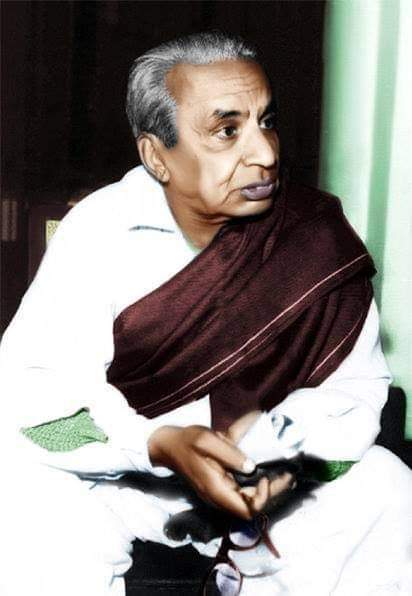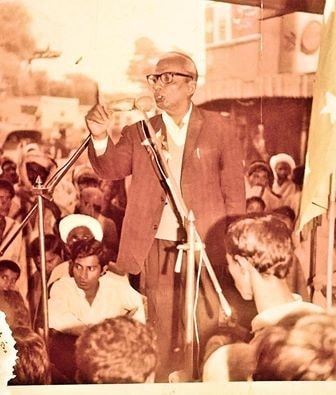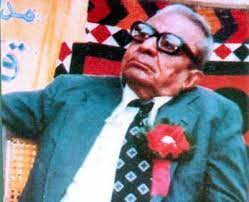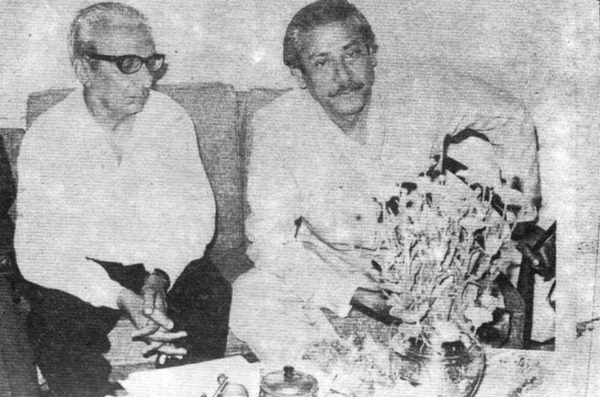
I am frightened of “personality cult. Only the “nation’s personality” should be aggrandized. The thought of “Personality cult” in itself is nothing but a phantom. It is useless to make an ideal of one’s own personality and worship it round the clock. Worshipping your own creation is a sickness. People who stick to such superstitions ultimately succumb to immoral suffocation. Thus, only the ones who will plough shall reap. – Qazi Faiz Muhammad.
[The 23rd November 1908 marked the day when Qazi Faiz Muhammad was born in a small city of Hallani, Nawabshah, Sindh in the house of Qazi Nabi Bux Siddiqui. Qazi Faiz Muhammad was a principled politician, social reformer, intellectual, educationalist, novelist, lawyer, classical musician and a progressive peasant leader. Since childhood, he had stemmed a vigorous passion to work and promote the traditional soul of Sindhi politics. For this, he joined the “Sindh Hari Committee” led by Hyder Bux Jatoi and remained a right hand man for Jatoi till his death. He stood adamant in supporting the pre-partition movement such as the “Quit India Movement” and also actively opposed the Simon Commission.
He observed hunger strike unto death for Sindhi language, joined students in their camp. He did not open his fast until his demands were accepted and the voters’ lists were announced to be published in Sindhi and one unit system was withdrawn. In Sindh, there was no match of Qazi Faiz Muhammad as a lawyer who fought the pro-bono cases of the farmers/peasants.
He was also incarcerated in the later years of his life for supporting Mujib-ur- Rehman in his rebellion against the Pakistani State for the secession of Bangladesh. Qazi Sahib was the senior vice president of All Pakistan Awami league. He stood by the people of then East Pakistan in all thick and thin. Qazi Faiz Mohammad had appeared before the Hamud-ur-Rehman Commission to record his statement on fall of Dhaka and its causes.
Qazi Faiz Mohammad has written three novels in Sindhi. All three novels of Qazi Faiz Mohammad possess their own repute and appreciation in the literary circles. In his literary services he has to his credit a book of essays in English regarding philosophy and nature.
Qazi Faiz Muhammad died on 13 October 1982 after a severe heart attack- Sindh Courier]
By Mrs. Irshad Abbasi
After the fall of Dhaka, the Pakistani establishment harassed my father, Qazi Faiz Muhammad. They did, what they could, to torment him. In view of such a painful situation my mother wanted to go for Umrah to have some relief at least for a few days. One day, she asked Baba, “You have spent your entire life in politics, and neither spent some time with children nor helped or shared my responsibilities. Now, it’s better to sell some of the land located in Nawabshah and take us to Saudi Arabia for pilgrimage.”
 Baba agreed to the suggestion and hurriedly sold some lands, and got prepared documents for travel to Saudi Arabia and Europe.
Baba agreed to the suggestion and hurriedly sold some lands, and got prepared documents for travel to Saudi Arabia and Europe.
At that time six of their children were married while four were still under-age and studying in Nawabshah.
It was early 1972 when my father, along with family, boarded the plane at Karachi airport but just before the take off some personnel of a security agency barged into plane and ordered ‘Qazi Faiz Muhammad should stand up’. Baba stood to enquire the matter and was told that the President Bhutto has directed not to allow him leave the country. Although, it was not so, but they used Zulfiqar Ali Bhutto’s name. It was their mischief but they wanted to defame Bhutto. Since there was no other way, Baba had to get off the plane along with his family and return to their home in Karachi.
After two days, Baba told our mother that he has to go to Mirpur Khas due to some engagement. He left for Mirpur Khas taking some money and putting three pairs of clothes in a small bag. “Don’t worry I will be back soon,” Baba said to Ama while leaving the home.
 Our mother left for Nawabshah after waiting for a week as there was no sign of Baba. For two years we were unaware of Baba’s whereabouts. We didn’t even know whether he is alive or not. We didn’t receive any information from any quarter despite searching him even at hospitals and wherever we could. All these years, we felt hanging on a cross.
Our mother left for Nawabshah after waiting for a week as there was no sign of Baba. For two years we were unaware of Baba’s whereabouts. We didn’t even know whether he is alive or not. We didn’t receive any information from any quarter despite searching him even at hospitals and wherever we could. All these years, we felt hanging on a cross.
I would now share the story of his missing period, which he later told us and also narrated in his autobiography.
Baba had left Mirpur Khas by foot for India crossing over the border, where he was arrested by the Indian security forces suspecting that he was a Pakistani spy. He was thoroughly interrogated and told that there are ‘shoot at sight’ orders for spies. Introducing himself as Senior Vice President of Awami League, Baba apprised them of the situation that had compelled him for the self-exile. “I wanted to go to Sheikh Mujib in Bangladesh,” Baba told the border security force officials.
The security officials immediately contacted their high ups who talked to the then Prime Minister Mrs. Indra Gandhi. After receiving such information, she called Sheikh Mujib who suggested her to admit Baba in a Delhi hospital in view of his health condition. “I will come myself to Delhi to receive Qazi Sahib,” Sheikh Mujib had told Indra Gandhi.
Since Baba had become so weak and developed ailments due to this agonizing journey, he was rushed to a hospital in Delhi in a helicopter, where he remained under treatment for a fortnight. Later, he was shifted to Dhaka where he stayed in State Guest House. Sheikh Mujib used to visit him daily and ensured that he is properly looked after and treated well.
 Realizing that he might be a burden on poor nation that had recently got freedom, Baba desired to return to Pakistan but Sheikh Mujib didn’t agree sensing the threat of life to him and his family. “They might kill you and your family. I will make arrangements of shifting here your entire family,” Sheikh Mujib shared his intention but Baba was reluctant to stay there any longer. “I want to go somewhere else, in any other country, to work for livelihood,” Baba told him.
Realizing that he might be a burden on poor nation that had recently got freedom, Baba desired to return to Pakistan but Sheikh Mujib didn’t agree sensing the threat of life to him and his family. “They might kill you and your family. I will make arrangements of shifting here your entire family,” Sheikh Mujib shared his intention but Baba was reluctant to stay there any longer. “I want to go somewhere else, in any other country, to work for livelihood,” Baba told him.
As Baba had extended full support to Sheikh Mujib for his 6-point charter of demands during his struggle, and used to visit Dhaka and attend the party meetings, he (Sheikh Mujib) even offered him to create any job opportunity for him in Bangladesh, but Baba didn’t want to create problems for Sheikh Mujib, because the Bengalis hated Pakistan and for that reason Sheikh Mujib had kept his stay at State Guest House a secret. “The people, who are opposed to you, will create problems for you. I wouldn’t like you to face such a situation, therefore send me somewhere else,” Baba finally told him.
Sheikh Mujib then sent Baba to Afghanistan where he was the guest of King Daud. From there Baba traveled to London on Afghan passport where he did some job for his livelihood. In London, he wrote several letters to Sindhi Hindus and offered them to jointly struggle for freedom of Sindh but they didn’t respond. Late Sindhi writer Keerat Babani had compiled a book of those letters.
After about one and half a year, the Pakistani agencies learnt about Baba’s presence in London. Sheikh Mujib was in constant touch with Baba, who once came to London and advised him to leave for America or Germany as he feared life threat to Baba. “I have made all the arrangements for you and your family in America and Germany. Your family will join there,” he told Baba.
Baba agreed to Sheikh Mujib’s suggestion, but while sitting at German embassy awaiting the visa after two days, he had strange thoughts – “I am running away from motherland, for which I struggled and suffered such pains. Would I be able to see my motherland again? ” Amid these thoughts, he cancelled his visit to Germany, traveled to Karachi on Afghan passport buying a transit ticket for Kabul.
There is another long story, full of miseries, about Baba’s life after his return to Karachi however I will share some other incidents, related to Baba and his family. Once, I attended a Milad ceremony in Islamabad. A Bengali woman was sitting beside me. During informal chat, when she learnt about Baba, she asked me to meet her outside after the Milad ends. “It’s important,” she urged.
When I came out after Milad, a man greeted me and introduced himself as the Ambassador of Bangladesh. “When I was posted as Ambassador to Pakistan, I had called on Prime Minister Sheikh Hasina, who had directed me to locate the Qazi Sahib and his family and inform her. On arrival here, I immediately inquired about Qazi Sahib and was informed about his demise while nobody knew about his family. Someone said his family members are perhaps settled abroad.”
“The woman you met was my wife. Soon as she learnt about you, she called me and I immediately informed Prime Minister Hasina Wajid, who asked me to contact the widow of Qazi Sahib, seek appointment and meet her even if I had to visit any remote village of Sindh. Now please tell me where we could meet her,” the Ambassador enquired.
I told the Ambassador that my mother too had passed away and all of my brothers and sisters are settled in Karachi. After two days, the Ambassador came to Karachi and invited us to visit Bangladesh. We all were invited to visit Bangladesh where we received the posthumous award for Baba.
____________________
Mrs. Irshad Abbasi is the daughter of Late Qazi Faiz Muhammad. She is settled in America.